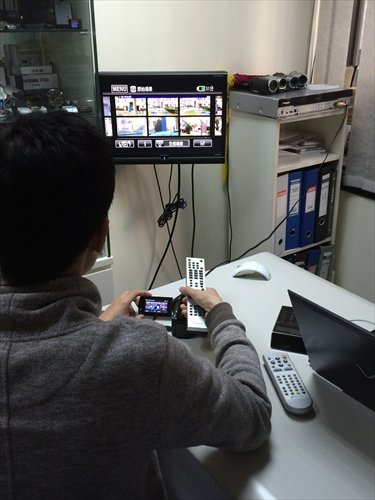Real-life private eye

Cheng edits a video footage he recorded during his business trip to Shanghai this March. Photo: Zhang Hui
Two young men, with gleaming eyes, paced the crowded club like tigers searching for prey. They slowed down while passing a group of high-school boys. One of the men nodded to a boy, whipped out a small plastic bag, slipped it into his hand and walked away.
Chris Cheng, wearing a bluetooth headset, cast sidelong glances at the scene as he played dice two tables away. When the boys disappeared into a private room, Cheng touched his headset, stood up and barged into the room.
"Oops! I walked into the wrong room! Sorry, guys!" said Cheng.
He stepped out, then left the club. Cheng's camera, hidden in his bluetooth headset, had captured a five-second scene of them snorting white powder. The powder was ketamine.
Cheng is not an undercover policeman. "I'd like to call what I do acting in real life," Cheng said.
He later handed video clips of the boy receiving and snorting ketamine to the boy's mother, who had hired Cheng to confirm her suspicions about her 17-year-old son taking drugs.
Helping parents spy on their children accounts for only a small portion of Cheng's cases as he spends most of his time tracking down mistresses for desperate wives. Customers pay around HK$50,000 ($6,449)to HK$70,000 for a seven-day-long affair case. In the drug case, the mother paid Cheng's company around HK$50,000.
Cheng, 34, a Hongkonger, is one of seven detectives in his company, Hong Kong Wan King On Investigations. There are about 10 private companies in Hong Kong listed online, and according to Cheng, 90 percent of them only have two or three employees. For the past eight years, Cheng has lived his private detective life acting as a drunken man, tailing people, taking sneaky snapshots and working undercover in different companies.
Unlike the Chinese mainland, where private investigations have been banned since 1993 as the government believes this overlaps with police duty, the industry in Hong Kong is under no official supervision.
Casually investigating
Cheng wanted to be an actor and even studied film. But after a few failed jobs, he found himself in the private detective business.
Cheng's friends always describe him as sneaking about and taking photos with a long lens camera, but the key to being a private detective is to look as normal as possible.
"I wear dark-colored clothes and walk casually without any large equipment when I tail people," Cheng said. "I've never been caught."
"And we also have secret cameras installed in necklaces, glasses or headphones to assist us," Cheng said as he opened a cabinet in his office in Hong Kong. The glass cabinet contains high-tech gadgets, such as small cameras that can be hidden inside a chewing gum box and machines to detect hidden cameras.
Of course, a good stalker requires special skills. Before tailing a target, Cheng would stare at the photo of the target for several minutes to imagine possible appearance changes, such as wearing glasses, makeup, or having a different hairstyle.
Then when he found the target, he would check the nearby crossroads and keep about 300 meters from his target.
He taught himself all of this as no professional training is provided in the industry.
Philic Man Hin-lam, director of the Hong Kong-based Global Investigation and Security Consultancy, pointed out the same problem.
Before she opened her own private investigation company, she worked for a small agency whose boss cheated clients and gave her no instructions.
"No licenses are required when people register a private detective company in Hong Kong," she said.
Mainland business
Besides working in Hong Kong, Cheng travels to the Chinese mainland up to three times a month. His work is simple: tailing and recording the mistresses of Hong Kong businessmen.
"I've been to Beijing, Shanghai, Chengdu and Shenzhen. Shanghai ranks first on my most visited cities list," Cheng said.
Cheng's recent trip to Shanghai was to videotape a man's alleged mistress for the man's wife.
In the 30-minute-long video, he filmed the woman's face, the street numbers of her apartment, the park where she walked her dog and the restaurant she dined at with a little boy.
Cheng carried the tiny digital video (DV) and followed the woman for four days. He clamped the DV at his waist with his right elbow and used his left hand to cover the front when he passed the woman to film her.
"What surprised me most was that the little boy looked exactly like my client's husband, and he's about 4 or 5 years old already," Cheng said. "I think my client is going to use it as evidence for a divorce."
Many Hongkongers hire detectives to collect evidence of their spouses engaging in affairs in order to divorce them in court.
But the evidence should be obtained legally, said Yan Xianming, a divorce lawyer at Hong Kong-based Christine M. Koo and Ip Solicitors and Notaries. Legal evidence is video or photography taken in a public place. Sneaking into someone's home, opening their mail or tapping their phone calls can land a detective in trouble, he said.
Mainland risks
However, private detectives face risks when they work in the Chinese mainland. The Chinese government has arrested over 2,500 private detectives including an unspecified number of Hong Kong private detectives as of early last year, according to Hong Kong Oriental Daily.
Cheng has heard of some of the cases, but he is confident of avoiding trouble. His fluent Mandarin helps him blend in with mainland residents, and he only carries a tiny DV set during his work.
But Cheng has his own worries in the mainland, mainly the air pollution. He will visit Beijing next week, and all his preparation involves praying for a clear day. The pollution not only reduces the visibility, but also forces more people to wear masks.
"How am I going to recognize my target in a mask?" Cheng said.